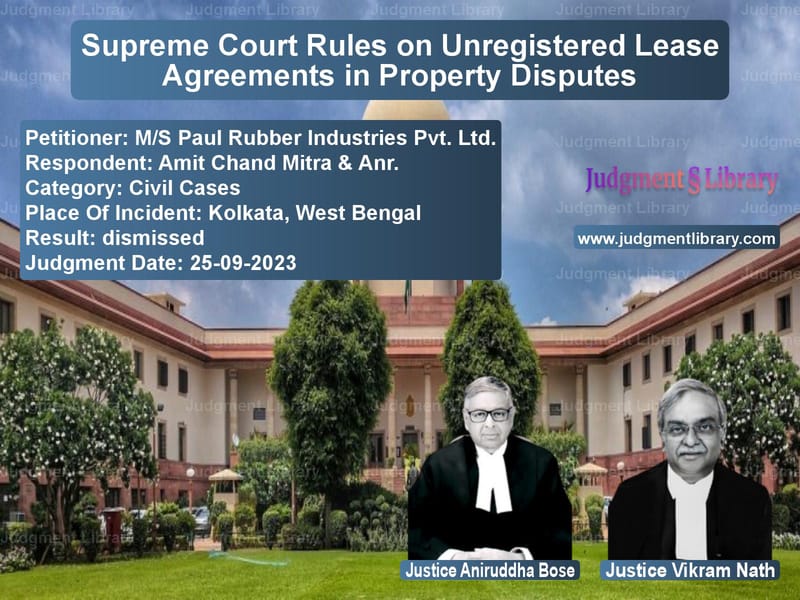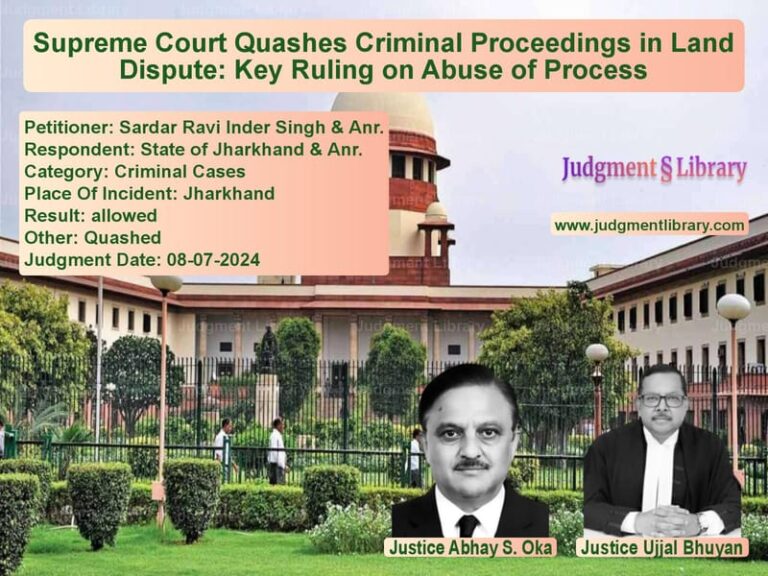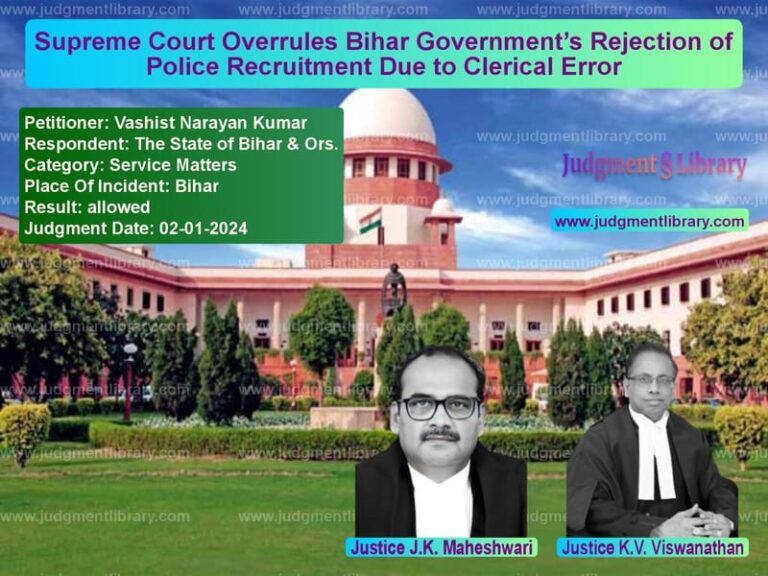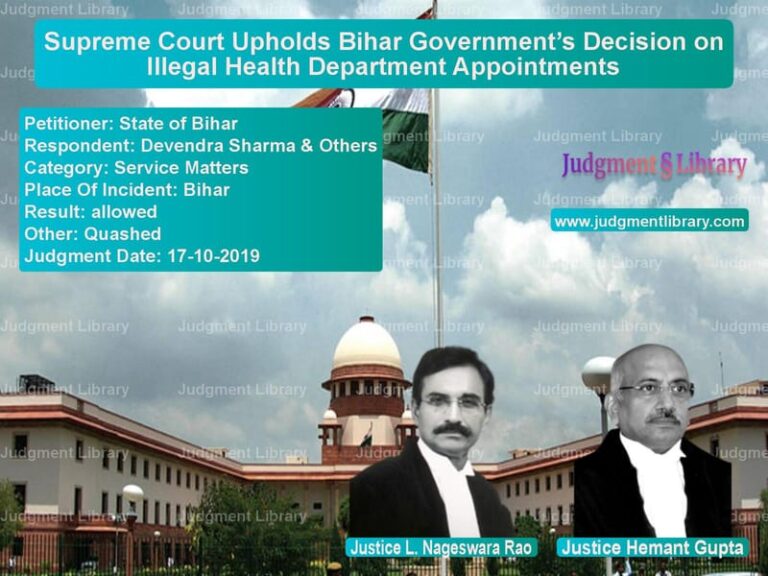Supreme Court Rules on Unregistered Lease Agreements in Property Disputes
The Supreme Court of India recently delivered a judgment in the case of M/S Paul Rubber Industries Pvt. Ltd. vs. Amit Chand Mitra & Anr., clarifying the evidentiary value of unregistered lease agreements in property disputes. The case revolved around a tenancy dispute involving a lease agreement executed on 27 March 2003 between the appellant, Paul Rubber Industries Pvt. Ltd., and the respondent, Sabita Mitra (landlady, now deceased). The Supreme Court upheld the Calcutta High Court’s decision that an unregistered lease document cannot be relied upon to determine the duration or validity of a lease.
Background of the Case
The dispute pertains to a property of approximately 16 cottahs (about 11,520 sq. ft.) located at Radha Madhab Dutta Garden Lane, Kolkata. The lease agreement stipulated a tenure of five years with an option for renewal. However, no formal renewal was executed, and upon the completion of the first five years on 31 October 2007, the landlady sought an increase in rent. The tenant did not respond to the rent enhancement request, leading to the issuance of a notice to vacate on 6 March 2008.
The respondents claimed that the tenancy was a month-to-month arrangement, which was terminated through a 15-day notice under Section 106 of the Transfer of Property Act, 1882. The appellant (tenant) refused to vacate, resulting in the filing of an eviction suit on 4 September 2008.
Read also: https://judgmentlibrary.com/supreme-court-upholds-validity-of-will-in-family-property-dispute/
Key Issues Raised
- Whether the unregistered lease agreement could be relied upon to determine the nature and duration of tenancy.
- Whether the lease was for a manufacturing purpose, necessitating a six-month notice under Section 106 of the Transfer of Property Act.
- Whether the eviction notice was legally valid.
Arguments by the Appellant (Tenant)
The tenant contended:
- The lease agreement explicitly provided for a five-year tenure with renewal, making the eviction notice invalid.
- The tenancy was for a manufacturing purpose, requiring six months’ notice for termination.
- The landlady had accepted rent in the past without issue, indicating that the tenancy was ongoing.
- The property should be considered a Thika tenancy, bringing it under special tenancy laws applicable in Kolkata.
Arguments by the Respondents (Landlord)
The respondents countered:
- The lease agreement was unregistered and thus could not be used to determine the tenancy period.
- The tenancy was month-to-month and terminable with 15 days’ notice.
- The tenant had defaulted in rent payments since October 2007.
- The property did not qualify as a Thika tenancy, as confirmed by the Thika Controller.
Findings of the Trial Court
The Trial Court ruled in favor of the landlady, holding that:
- The lease agreement was unregistered and, under Section 49 of the Registration Act, 1908, could not be used to establish tenancy rights.
- The tenancy was a month-to-month arrangement, requiring only 15 days’ notice.
- The tenant had defaulted on rent payments.
- The Thika Controller had already determined that the property was not vested in the state.
Calcutta High Court’s Decision
The Division Bench of the Calcutta High Court upheld the Trial Court’s judgment, stating that an unregistered lease agreement cannot be used to determine tenancy duration. The High Court also found that the tenant failed to prove that the lease was for a manufacturing purpose.
Supreme Court’s Observations
The Supreme Court, comprising Justices Aniruddha Bose and Vikram Nath, upheld the High Court’s ruling, making the following key observations:
1. Unregistered Lease Agreements Cannot Be Used as Evidence
The Court reaffirmed that under Section 49 of the Registration Act, an unregistered lease document cannot be used to establish tenancy duration:
“A lease of immovable property from year to year, or for any term exceeding one year, or reserving a yearly rent, can be made only by a registered instrument.”
2. Manufacturing Purpose Not Proven
The Court noted that the burden of proving that the lease was for manufacturing purposes rested on the tenant. The appellant failed to provide evidence beyond a self-serving statement:
“A mere assertion that the premises was used for manufacturing does not suffice; the tenant must establish that the lease was expressly for that purpose.”
3. Validity of Eviction Notice
The Court ruled that the eviction notice was legally valid, as the lease had not been renewed and was deemed a month-to-month tenancy:
“The 15-day notice was sufficient under Section 106 of the Transfer of Property Act, and the landlord was entitled to recover possession.”
4. Thika Tenancy Claim Rejected
The Supreme Court upheld the Thika Controller’s decision that the property was not a Thika tenancy and was owned by the landlady.
Supreme Court’s Final Verdict
Based on these findings, the Supreme Court dismissed the appeal, holding:
- The lease agreement was inadmissible due to non-registration.
- The tenancy was month-to-month, requiring only 15 days’ notice.
- The appellant failed to prove that the lease was for manufacturing purposes.
- The landlord was entitled to possession of the property.
Implications of the Judgment
This ruling has significant implications for property disputes involving unregistered lease agreements:
- Mandatory Registration: Leases exceeding one year must be registered to be legally enforceable.
- Burden of Proof: Tenants must provide clear evidence if they claim the lease was for manufacturing purposes.
- Eviction Rights: Landlords can terminate month-to-month tenancies with 15 days’ notice.
- Enforcement of Legal Formalities: Informal tenancy arrangements carry significant legal risks.
Conclusion
The Supreme Court’s decision in M/S Paul Rubber Industries Pvt. Ltd. vs. Amit Chand Mitra & Anr. serves as a landmark ruling on the enforceability of unregistered lease agreements. By clarifying the legal position on tenancy rights and eviction procedures, the Court has provided much-needed clarity on property lease disputes.
The judgment underscores the importance of registering lease agreements, ensuring compliance with tenancy laws, and following due process in eviction cases. Property owners and tenants alike must adhere to these legal requirements to avoid disputes and ensure enforceability in courts.
Petitioner Name: M/S Paul Rubber Industries Pvt. Ltd..Respondent Name: Amit Chand Mitra & Anr..Judgment By: Justice Aniruddha Bose, Justice Vikram Nath.Place Of Incident: Kolkata, West Bengal.Judgment Date: 25-09-2023.
Don’t miss out on the full details! Download the complete judgment in PDF format below and gain valuable insights instantly!
Download Judgment: ms-paul-rubber-indu-vs-amit-chand-mitra-&-a-supreme-court-of-india-judgment-dated-25-09-2023.pdf
Directly Download Judgment: Directly download this Judgment
See all petitions in Property Disputes
See all petitions in Contract Disputes
See all petitions in Landlord-Tenant Disputes
See all petitions in Judgment by Aniruddha Bose
See all petitions in Judgment by Vikram Nath
See all petitions in dismissed
See all petitions in supreme court of India judgments September 2023
See all petitions in 2023 judgments
See all posts in Civil Cases Category
See all allowed petitions in Civil Cases Category
See all Dismissed petitions in Civil Cases Category
See all partially allowed petitions in Civil Cases Category







